Shinzo Abe steps down, and Russia may forget about peace treaty
Japanese Prime Minister Shinzo Abe announced his resignation on Friday, August 28. Having reported this, Abe stressed out that he had not yet resolved the issue of signing a peace treaty with Russia, of which he regrets.

Why Japanese Prime Minister has resigned
Only four days ago, Shinzo Abe set a record for serving as the head of the Japanese government - 2799 days. This is the longest tenure for the prime minister of Japan.
The decision to resign came very unexpected even for fellow members of the Liberal Democratic Party.
Shinzo Abe explained that he had made such a decision due to the aggravation of ulcerative colitis:
"Ulcerative colitis has returned. I need to continue treatment for some time. I made the decision, because I could not afford resign all of a sudden, like in my previous term," Shinzo Abe said.
The disease forced Abe to resign from the post of prime minister in 2007, but he had chaired the Japanese government for a very short time by that time, because he had taken the post in 2006. Five years later, Abe returned and set a record for leading the government.
Why the peace treaty didn't work
One of the main foreign policy tasks for Shinzo Abe was the signing of the peace treaty with Russia. Abe has developed very good relations with Russian President Putin. At times, it seemed that the talks on the treaty were developing successfully.
The stumbling block in the talks is the territorial dispute between Russia and Japan. Japan wants Russia to return its "northern territories" - several islands of the South Kuril chain. There was certain progress achieved in establishing cooperation, the Japanese began to visit the islands more frequently. However, the main thing remained unchanged - Tokyo linked the signing of the peace treaty with the delivery of the Russian islands to Japan.
From the Russian point of view, the Japanese had rather conditional "flexibility" in the matter. For example, at one point there was a rumor about the delivery of the islands in accordance with the 1956 Moscow Declaration. The Soviet Union had then agreed to consider the issue of the islands of Habomai and Shikotan provided that Japan fulfilled certain conditions, primarily after the signing of the peace treaty.
In general, there was no progressed reached in Russia-Japan peace treaty talks. The issue has been shelved yet again.
As for possible successors to Shinzo Abe as prime minister, almost all of them share a much stance. For example, they name the secretary of the Liberal Democratic Party, former Defense Minister Shigeru Ishiba or the sitting Defense Minister and former foreign minister Taro Kono. They consider Shinzo Abe's stance on the negotiations with Moscow too soft.
In the foreseeable future, chances for Russia to conclude an agreement with Japan are extremely low.
Subscribe to Pravda.Ru Telegram channel, Facebook, RSS!


